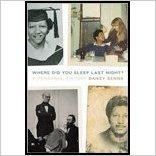
Senna’s narrative is very much in the vein of Walls’ The Glass Castle or Bragg’s All Over But the Shoutin. It surpasses both for its examination, not only of Senna’s parents relationship, but for its exploration of identity today, yesterday and tomorrow.
Carl Senna is a black man born in the south when Jim Crow was alive and well. Fanny Howe, on the other hand, was born of eminent Bostonians whose histories are traceable back to the Mayflower. Of her parents’ divorce Senna says “The divorce was so ugly because the marriage was so unequivocally beautiful. My parents’ marriage had been steeped from the start in symbolism. Together they were going to snub the history that divided them and create an ahistorical utopia in our home. When their marriage failed so drastically – when history seemed to catch up with them – it must have seemed to them and those who witnessed that rupture like the death of a promise far larger than their wedding vows.” Senna has distilled her writing to a precise and beautiful account of her search for her father’s past. While her mother’s family history is well documented, she was only aware of vague snippets of her father’s southern roots. “As [her] father says, one side is unusually – even compulsively - documented, and the other is a black hole that when you call into it – who are you? – only swallows back the very question.” Senna begins her story by sharing a time when her father asks a five-year-old Danzy “Don’t you know who I am?” This recurring theme gave this reader chills as Senna comes closer and closer to answering this most searching of questions.
